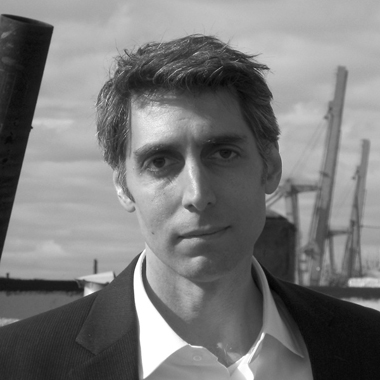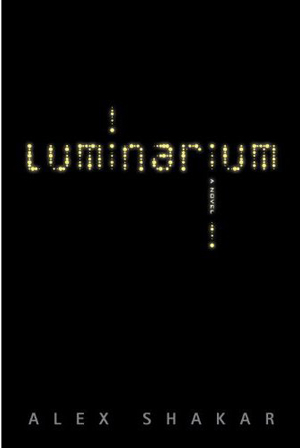Alex Shakar Illuminates Us About Luminarium
By Steven Pate in Arts & Entertainment on Aug 22, 2011 4:00PM
 Don't call it a 9/11 novel. Whatever author Alex Shakar's ambitious, intricate and searching second novel Luminarium may be, it is much more than its backdrop of the fifth anniversary of that attack. The book follows Fred Brounian as he makes sense of himself and his world, where his software company is hijacked by the "Military-Entertainment Complex," the only positive vibes in his shambles of a personal life seem to be side effects of a neuroscientific research study, and texts and emails from his comatose twin brother start popping up. As a writer, Shakar is somehow a satirist of technology, an experimental scientist, a spiritual guide and a game designer rolled into one, but to make a setting such as 9/11 commemoration recede into a supporting role, he also moonlights as a magician.
Don't call it a 9/11 novel. Whatever author Alex Shakar's ambitious, intricate and searching second novel Luminarium may be, it is much more than its backdrop of the fifth anniversary of that attack. The book follows Fred Brounian as he makes sense of himself and his world, where his software company is hijacked by the "Military-Entertainment Complex," the only positive vibes in his shambles of a personal life seem to be side effects of a neuroscientific research study, and texts and emails from his comatose twin brother start popping up. As a writer, Shakar is somehow a satirist of technology, an experimental scientist, a spiritual guide and a game designer rolled into one, but to make a setting such as 9/11 commemoration recede into a supporting role, he also moonlights as a magician.
Born in Brooklyn, NY, Shakar teaches fiction at the University of Illinois at Urbana-Champaign and lives in Chicago with his wife, composer Olivia Block. It's been ten years since his debut novel, The Savage Girl saw a white-hot critical trajectory flicker out in an instant, when 9/11 made its dark skewering of consumerism presaging of "postirony" seemingly the last things anyone wanted to read about. The time has been well spent. We discussed the journey on which this novel has taken its author.
The book release party for Alex Shakar's Luminarium, from Soho Press, is tomorrow, Tuesday, August 23, at 6 pm at Lush Wine and Spirits, 1257 S. Halsted St. The $30 admission includes a copy of the book and refreshments. For info e-mail events@semcoop.com.
C: Where did the idea for Luminarium originally come from?
AS: Originally, I read an article about a Canadian researcher who had designed an electromagnetic helmet that gave people sense presence experiences, or that's what he claimed that it did. I thought there might be a little story there. As the story started evolving, there was a friend of mine who had a computer company, a software company, they were making a virtual word for children, this cartoony-kind of place that was very idealistic. Then after 9/11 their venture capital started drying up and there was this gold rush in something they were calling the military-entertainment complex. I watched this virtual world for children transformed into a military training ground. That became a part of the story as well. Those might have been two of the real precipitating events.
C: This is a book you've been working on for a while.
AS: I started out thinking it might take a year or so. It kept evolving. It kept showing me different directions to go in and I just had to follow it. I originally thought it was going to be a very short book set here in Chicago, actually. After 9/11 I came back here and started thinking about that and realized that there was something pulling me to New York again. So the book started evolving, and there were a few very different drafts. It kept sucking for a long time, because I had trouble figuring out what it was about. It was hard for me to get beneath the surface of what I was trying to write about and it took me a while to break through the crust and get to the marrow.
C: What was the thing that made it stop sucking?
AS: The funny thing is that it was George, the twin brother. He wasn't in the early drafts at all. In 2007 I had a book that I thought was done, but it was not working. I had this idea for a twin brother really early on but I kept rejecting it. I thought that this book has so many moving parts already, what is one more going to do to it? But once I started following it, it became the whole backbone of the novel. Everything, emotionally and structurally, really snapped together in a way that was really exciting for me. It was a complete rewriting of the book.
C: It opens up another front in the main character Fred's battle with his own sense of self. Eventually, he realizes the contingency of the sense of self in a really fundamental way.
AS: The book became about duality in a lot of ways. George allowed me to say something that I think is true about of our relationships with ourselves. We have these voices in our heads, and which of them is ours? Is any of them ours? It allowed me to externalize and manifest some of the metaphysical and psychological issues I was trying to get at.
 C: There's a good deal of self-conscious exploration of mental states, through meditation and through science. Did you seek out your own experiences to base those on?
C: There's a good deal of self-conscious exploration of mental states, through meditation and through science. Did you seek out your own experiences to base those on?
AS: I was writing this book about spirituality and I'd been reading a lot about it but it just wasn't in my family background or my childhood. My mother had bad experiences with religion growing up and so it just wasn't part of my life growing up. Once I started reading about it, I was drawn to the writings of mystics more than religious historians or philosophers. I started getting really curious and also feeling like I needed to experience something myself. I went to a zen-do and got some instructions on how to sit and how to breathe. That first class was all just how to sit and how to breathe. I thought, oh how useless is this, you know, these are things I've been doing all my life? But I stuck with it and I'm still sticking with it, it's something that's become part of my life. It feels like it has taught me a lot and helped me get deeper into what the book was about. The book was almost my twin, in a way. We're both evolving together, we're both teaching each other. I could see where it was lacking, it could see where I was lacking. I felt like we were challenging each other to get a little bit better.
C: Fred assumes a posture of skepticism at the outset, and then there are these scientific experiments which almost make him doubt his skepticism in a way, the inverse of a conventional story of a person of faith overcoming their doubts. Then there are these other elements that almost re-mystify the scientific knowledge that has been passed along.
AS: In Zen that they have a saying that there are three things that are required for enlightenment: great faith, great doubt and great effort. I was just blown away by the great doubt. It threw my thinking around a bit, the idea of a faith where doubt could play an essential part. I was interested in looking at Fred, who was good at doubt, so maybe doubt is his path. If you follow doubt all the way, where does it actually go? The more I followed the story, and my life was changing in different ways, I started being as unsatisfied with the “new atheism” that's out there as I was with fundamentalist religion. Both of those camps seemed to me that they were just missing the point. You have the core of religion—where you have the monks and the mediators and the mystics—on the one hand, and you have neurologists on the other hand, and they seem not to be in disagreement at all when it comes to the issue of what the self is, and what it isn't. That was a real reframing of how I came to look at things, and that became Fred's trajectory as well.
C: Is it too much for me to infer that Fred's enlightenment about his attitude towards the world and his self informs the way we might or that we should deal with events like 9/11, the fifth anniversary of which is the backdrop for the plot?
AS: I wasn't interested in 9/11 per se or in writing another 9/11 novel. What was interesting to me was this whole terrain of how 9/11 was being interpreted and spun and woven into people's sense of personal meaning and identities, in terms of their politics and of all their inner narratives. It gets very noisy, very loud. People are attached to their opinions about it one way or the other, and want to make meaning out of the events that happen. I was aware of that impulse in myself to want to make meaning out of 9/11 and how that relates to my own life history and what it was supposed to be. The interesting thing was to get outside of that mode and without necessarily giving any answers, to show from another perspective how we relate to the world and make meaning out of it.
What was interesting to me about that period, five years after, was that to me it marks the beginning of when 9/11 was just becoming history. I remember going to memorial services that day and seeing kids who weren't even born that day along with all the people trying to make sense of it. As a culture, we're increasingly atomized, increasingly following our own narratives and tuning out everyone else's. There's still a lot of denial going on. It does seem like at this moment the fragility of our system is more apparent than ever. But maybe with that awareness might be an opportunity. There's a lack of awareness of our interconnectedness, in the book that was a metaphysical dimension to the subject of virtual reality. Virtual reality was different things in the book, but ultimately for me it was what's going on in here [points to head]. Even the military-entertainment complex was, ultimately, about the mind. All the military entertainment running in our mind.
C: In the piece you wrote at The Millions you talk about the effect 9/11 had on that huge moment in your life. In retrospect, with The Savage Girl seeming prescient about that era and aboutthat disaster, and now with a new novel trying trying to put those things in context from a later time... are you tired of getting questions about 9/11?
AS: [Laughs] I'm ready to move on. It's funny. I don't know what to call this one. Some people are calling it a 9/11 novel, some people are calling it a post-9/11 novel. One person suggested it's an anti-9/11 novel. I think it's got elements of all of those.
C: So when do we get the Chicago novel? I think you owe us one.
AS: [Laughs] Maybe that's next.